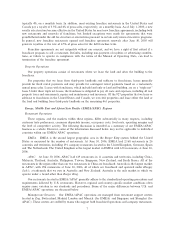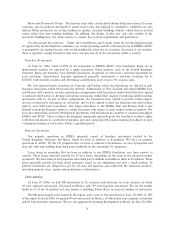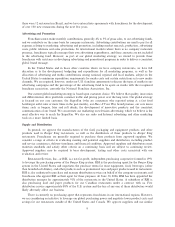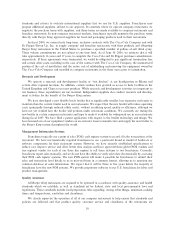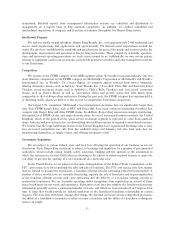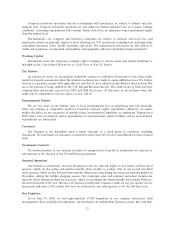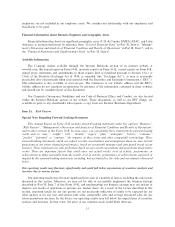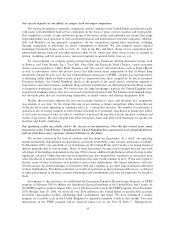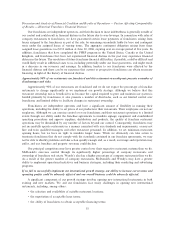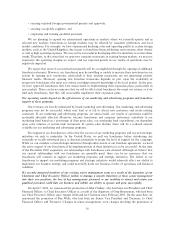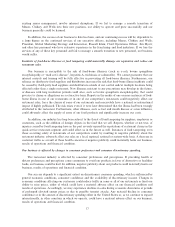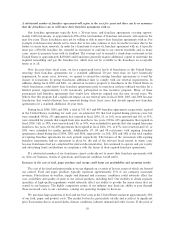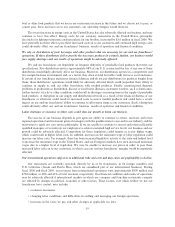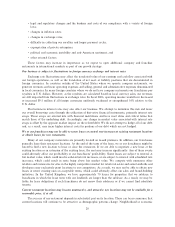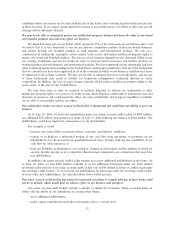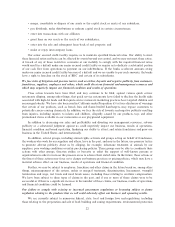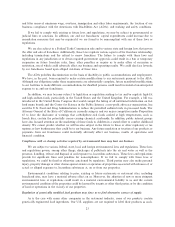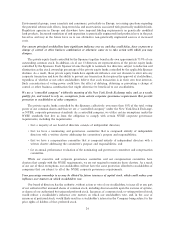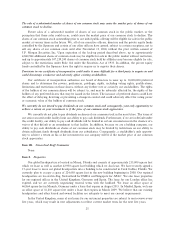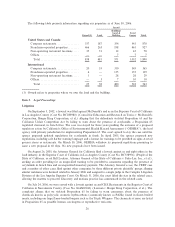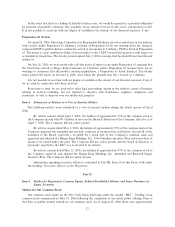Burger King 2006 Annual Report Download - page 29
Download and view the complete annual report
Please find page 29 of the 2006 Burger King annual report below. You can navigate through the pages in the report by either clicking on the pages listed below, or by using the keyword search tool below to find specific information within the annual report.existing senior management, involve inherent disruptions. If we fail to manage a smooth transition of
Messrs. Chidsey and Wells into their new positions, our ability to operate and grow successfully and our
business generally could be harmed.
In addition, the success of our business to date has been, and our continuing success will be, dependent to
a large degree on the continued services of our executive officers, including Messrs. Chidsey and Wells;
President, Global Marketing Strategy and Innovation, Russell Klein; Chief Operations Officer, Jim Hyatt;
and other key personnel who have extensive experience in the franchising and food industries. If we lose the
services of any of these key personnel and fail to manage a smooth transition to new personnel, our business
would suffer.
Incidents of food-borne illnesses or food tampering could materially damage our reputation and reduce our
restaurant sales.
Our business is susceptible to the risk of food-borne illnesses (such as e-coli, bovine spongiform
encephalopathy or ""mad cow's disease'', hepatitis A, trichinosis or salmonella). We cannot guarantee that our
internal controls and training will be fully effective in preventing all food-borne illnesses. Furthermore, our
reliance on third-party food suppliers and distributors increases the risk that food-borne illness incidents could
be caused by third-party food suppliers and distributors outside of our control and/or multiple locations being
affected rather than a single restaurant. New illnesses resistant to any precautions may develop in the future,
or diseases with long incubation periods could arise, such as bovine spongiform encephalopathy, that could
give rise to claims or allegations on a retroactive basis. Reports in the media of one or more instances of food-
borne illness in one of our restaurants or in one of our competitor's restaurants could negatively affect our
restaurant sales, force the closure of some of our restaurants and conceivably have a national or international
impact if highly publicized. The risk exists even if it were later determined that the illness had been wrongly
attributed to the restaurant. Furthermore, other illnesses, such as foot and mouth disease or avian influenza,
could adversely affect the supply of some of our food products and significantly increase our costs.
In addition, our industry has long been subject to the threat of food tampering by suppliers, employees or
customers, such as the addition of foreign objects in the food that we sell. Reports, whether or not true, of
injuries caused by food tampering have in the past severely injured the reputations of restaurant chains in the
quick service restaurant segment and could affect us in the future as well. Instances of food tampering, even
those occurring solely at restaurants of our competitors could, by resulting in negative publicity about the
restaurant industry, adversely affect our sales on a local, regional, national or system-wide basis. A decrease in
customer traffic as a result of these health concerns or negative publicity could materially harm our business,
results of operations and financial condition.
Our business is affected by changes in consumer preferences and consumer discretionary spending.
The restaurant industry is affected by consumer preferences and perceptions. If prevailing health or
dietary preferences and perceptions cause consumers to avoid our products in favor of alternative or healthier
foods, our business could be hurt. In addition, negative publicity about our products could materially harm our
business, results of operations and financial condition.
Our success depends to a significant extent on discretionary consumer spending, which is influenced by
general economic conditions, consumer confidence and the availability of discretionary income. Changes in
economic conditions affecting our customers could reduce traffic in some or all of our restaurants or limit our
ability to raise prices, either of which could have a material adverse effect on our financial condition and
results of operations. Accordingly, we may experience declines in sales during economic downturns or periods
of prolonged elevated energy prices or due to possible terrorist attacks. Any material decline in consumer
confidence or in the amount of discretionary spending either in the United States or, as we continue to expand
internationally, in other countries in which we operate, could have a material adverse effect on our business,
results of operations and financial condition.
17


